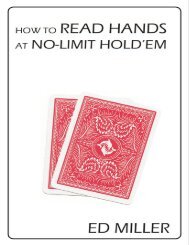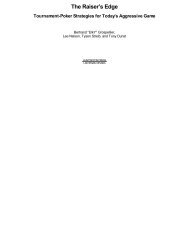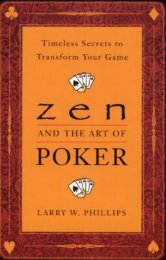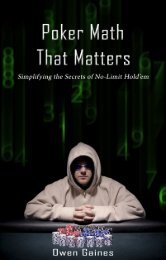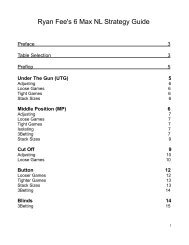- Page 2 and 3:
Get $150 Dollars Bankroll For Free
- Page 4 and 5:
CLICK HERE TO DOWNLOAD POKEROFFICE
- Page 7 and 8:
Practical Poker Math By Pat Dittmar
- Page 9 and 10:
Thanks to some Friends for their la
- Page 11 and 12:
Table of Contents Preface . . . . .
- Page 13:
Odds with 2 Cards to Come . . . . .
- Page 16 and 17:
This is not perfect knowledge. It i
- Page 18 and 19:
Practical Poker Math The first aim
- Page 20 and 21:
1. Introduction to Game Theory in P
- Page 22 and 23:
1. Introduction to Game Theory in P
- Page 24 and 25:
1. Introduction to Game Theory in P
- Page 26 and 27:
1. Introduction to Game Theory in P
- Page 28 and 29:
2. The Basic Calculations Total Pos
- Page 30 and 31:
2. The Basic Calculations Another w
- Page 32 and 33:
2. The Basic Calculations Combinati
- Page 34 and 35:
2. The Basic Calculations This can
- Page 36 and 37: 2. The Basic Calculations 52 * 51 =
- Page 38 and 39: 2. The Basic Calculations pot odds
- Page 40 and 41: 2. The Basic Calculations Total Odd
- Page 42 and 43: 2. The Basic Calculations Odds in T
- Page 44 and 45: 2. The Basic Calculations number of
- Page 46 and 47: 2. The Basic Calculations sible fro
- Page 48 and 49: 2. The Basic Calculations Open Ende
- Page 50 and 51: 2. The Basic Calculations Odds of a
- Page 52 and 53: 2. The Basic Calculations After the
- Page 54 and 55: 2. The Basic Calculations The odds
- Page 56 and 57: 2. The Basic Calculations (48 * 47
- Page 58 and 59: 2. The Basic Calculations After the
- Page 60 and 61: 2. The Basic Calculations Therefore
- Page 62 and 63: 2. The Basic Calculations Before th
- Page 64 and 65: 3. Odds in Texas Hold’em ♦ The
- Page 66 and 67: 3. Odds in Texas Hold’em the arti
- Page 68 and 69: 3. Odds in Texas Hold’em In a ful
- Page 70 and 71: 3. Odds in Texas Hold’em The tabl
- Page 72 and 73: 3. Odds in Texas Hold’em Pocket A
- Page 74 and 75: 3. Odds in Texas Hold’em WILLNOTs
- Page 76 and 77: 3. Odds in Texas Hold’em 54 1,326
- Page 78 and 79: 3. Odds in Texas Hold’em Axs Comb
- Page 80 and 81: 3. Odds in Texas Hold’em 2 Big Ca
- Page 82 and 83: 3. Odds in Texas Hold’em Among th
- Page 84 and 85: 3. Odds in Texas Hold’em consider
- Page 88 and 89: 3. Odds in Texas Hold’em 1 * 100
- Page 90 and 91: 3. Odds in Texas Hold’em Starting
- Page 92 and 93: 3. Odds in Texas Hold’em the pock
- Page 94 and 95: 3. Odds in Texas Hold’em Odds of
- Page 96 and 97: 3. Odds in Texas Hold’em rank, th
- Page 98 and 99: 3. Odds in Texas Hold’em 39 * 55
- Page 100 and 101: 3. Odds in Texas Hold’em After yo
- Page 102 and 103: 3. Odds in Texas Hold’em Suited C
- Page 104 and 105: 3. Odds in Texas Hold’em Total Po
- Page 106 and 107: 3. Odds in Texas Hold’em 2 Big Ca
- Page 108 and 109: 3. Odds in Texas Hold’em with AJ
- Page 110 and 111: 3. Odds in Texas Hold’em 2 Unpair
- Page 112 and 113: 3. Odds in Texas Hold’em ♦ Like
- Page 114 and 115: 3. Odds in Texas Hold’em must hav
- Page 116 and 117: 3. Odds in Texas Hold’em Pair >>>
- Page 118 and 119: 3. Odds in Texas Hold’em Open Str
- Page 120 and 121: 3. Odds in Texas Hold’em Set >>>
- Page 122 and 123: 3. Odds in Texas Hold’em After th
- Page 124 and 125: 3. Odds in Texas Hold’em Odds of
- Page 126 and 127: 3. Odds in Texas Hold’em Open Str
- Page 128 and 129: 3. Odds in Texas Hold’em (10 * 9)
- Page 130 and 131: 3. Odds in Texas Hold’em 172 + 2
- Page 132 and 133: 3. Odds in Texas Hold’em Runner -
- Page 134 and 135: 3. Odds in Texas Hold’em 1 Pair >
- Page 136 and 137:
3. Odds in Texas Hold’em For each
- Page 138 and 139:
3. Odds in Texas Hold’em With onl
- Page 140 and 141:
3. Odds in Texas Hold’em 2 Unpair
- Page 142 and 143:
3. Odds in Texas Hold’em Thus of
- Page 144 and 145:
3. Odds in Texas Hold’em Odds of
- Page 146 and 147:
3. Odds in Texas Hold’em 2 Pair >
- Page 148 and 149:
3. Odds in Texas Hold’em still 9
- Page 150 and 151:
3. Odds in Texas Hold’em Open End
- Page 152 and 153:
3. Odds in Texas Hold’em 2. The g
- Page 154 and 155:
4. Consolidated Odds Tables Texas H
- Page 156 and 157:
4. Consolidated Odds Tables After t
- Page 158 and 159:
4. Consolidated Odds Tables After T
- Page 160 and 161:
4. Consolidated Odds Tables Startin
- Page 162 and 163:
4. Consolidated Odds Tables Hand Af
- Page 165 and 166:
5. Odds in Omaha Hi-Lo In a 10-hand
- Page 167 and 168:
Starting Hands Your first chance to
- Page 169 and 170:
As demonstrated in Chapter 1, The B
- Page 171 and 172:
The odds of exactly one pair of Ace
- Page 173 and 174:
A2/AK Single Suited to the Ace For
- Page 175 and 176:
The number of 3-card combinations t
- Page 177 and 178:
The probability of A23 with the Ace
- Page 179 and 180:
AA2X Single Suited to A For the Flu
- Page 181 and 182:
There are 6 2-card combinations tha
- Page 183 and 184:
WILLNOTs (270,629) : WILLs (96) 270
- Page 185 and 186:
There are only 2 2-card combination
- Page 187 and 188:
Probably Not Playable With the thre
- Page 189 and 190:
Before the Flop In both Omaha High
- Page 191 and 192:
The Calculations These calculations
- Page 193 and 194:
Low hand (2), minus the 6 cards tha
- Page 195 and 196:
AA23 >>> Wheel or Aces Full To flop
- Page 197 and 198:
From the calculations above, we kno
- Page 199 and 200:
Total Possibilities = 17,296 - WILL
- Page 201 and 202:
Odds of Flopping an Ace High Flush
- Page 203 and 204:
Reduce 13,936 / 3,360 : 3,360/ 3,36
- Page 205 and 206:
(24 * 23) = 276 (1 * 2) 276 - 36 =
- Page 207 and 208:
(48 * 47) * 6 = 6,768 (1 * 2) Total
- Page 209 and 210:
After the Flop Nut Hand or Nut Draw
- Page 211 and 212:
1. Whether or not there will be a p
- Page 213 and 214:
The Calculations With the Turn card
- Page 215 and 216:
21 * 100 = 46.7% 45 Wheel (A2345) D
- Page 217 and 218:
Total Possibilities = 45 - WILLs =
- Page 219 and 220:
Odds of Turning a Boat or Quads WIL
- Page 221 and 222:
The Calculations After the Flop and
- Page 223 and 224:
Low Draw with Backup Low Card in th
- Page 225 and 226:
164 + 6 = 170 possible 2-card combi
- Page 227 and 228:
Flush Draw & Low Draw >>> Flush or
- Page 229 and 230:
296 + 28 = 324 possible 2-card comb
- Page 231 and 232:
Reduce 812 / 178 : 178 / 178 4.6 :
- Page 233 and 234:
Runner — Runner Remember — runn
- Page 235 and 236:
830 / 160 : 160 / 160 5.2 : 1 Back
- Page 237 and 238:
For each of these 3 sets there are
- Page 239 and 240:
Odds of a Runner-Runner 2 Pair or S
- Page 241 and 242:
Before the Last Card After the Turn
- Page 243 and 244:
The Calculations With one card to c
- Page 245 and 246:
2 Pair >>> Full House Reduce 23 / 2
- Page 247 and 248:
Open Ended Straight Draw & Flush Dr
- Page 249:
The River Bet All the cards are out



